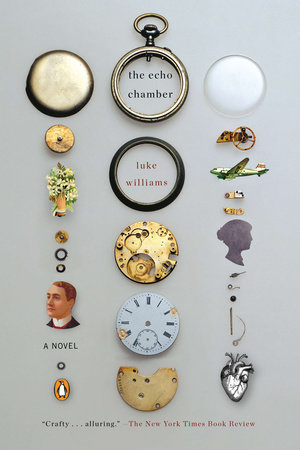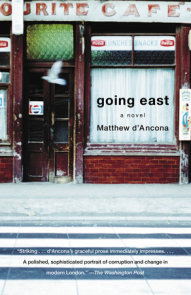READERS GUIDE
Questions and Topics for Discussion
INTRODUCTION
The Echo Chamber presents us with one of the most distinctive narrators in recent fiction, fifty-four-year old Evie Steppman, who grew up during the dying years of the British Empire in Nigeria. She retraces her life history, but unlike most narrators, who take early childhood as their starting point, Evie begins her story in the womb. There, what will become her most remarkable trait—her supersensitive powers of hearing—is already taking shape.
From the womb she can detect the murmur of the sea, “the sharp salute of gunfire and the chimes of Lagos clock… the coursing hum of blood” and her father’s nightly readings. And though she claims that words cannot describe the vibrancy of her hearing, the novel is filled with the most extraordinary auditory feats. As an adult, she can perceive “teacups rattling, the sound of Father playing solitaire, clocks, footsteps, the bulb-horn of a goods lorry… the sound of the driver’s forehead pressed against the windscreen, vibrating in time to the engine idling” [p. 7].
Evie writes her history alone in her attic in Scotland, sorting through the emotionally charged objects from her past—a phonograph, audio cassettes, keys, mirrors, an elephant tusk, a mappa mundi, shoes, letters, pocket change, photographs. They call up memories of all those Evie has known: of her mother, who, after trying to induce a miscarriage, dies giving birth to Evie; of her grandfather, a fanciful watchmaker who builds a clockwork heart in an attempt to cure his sick wife; of her friend Ade, who abandons her; of Nikolas, king of the nightsoil workers; of her lover Damaris, the mime artist, and their travels across America; and many others. Evie is driven to record the events of her life before they are lost, beyond the reach of memory.
The novel is, first, an extended lyrical meditation on the relation between sound and silence as Evie is alternately obsessed with perceiving sounds and pursuing silence. She is both fascinated and tormented by sounds. During her trip to America with Damaris she obsessively pursues her project to record unusual, soon-to-be-extinct sounds—an obsession that destroys her only love affair. But she is also tormented by the “din of herself,” the noise of her own body.
Much of The Echo Chamber plays out in the context of British colonialism in Nigeria. As the British Empire begins to lose its grip on Africa and Nigeria demands independence, Evie finds her relationships with her Nigerian friends and neighbors beginning to fray. She feels the race divide widening and begins to sense herself as an outsider, an intruder. “What I had thought of as absolute—my right to consider Nigeria as home—others saw almost as an aberration” [p. 210]. Later she hears a vivid eyewitness account of a brutal massacre during the civil war that followed British withdrawal.
But The Echo Chamber is much richer than any synopsis can suggest. It is a deeply immersive, sensuous and emotional experience, an impressionistic novel that ranges widely in both outer and inner worlds, exploring with an almost Proustian subtlety the effects of sound and silence as one remarkable woman journeys through her past.
ABOUT LUKE WILLIAMS
Luke Williams was born in 1977. He grew up in Fife, Scotland, and now divides his time between Edinburgh and London.The Echo Chamber is his first novel.
A CONVERSATION WITH LUKE WILLIAMS
Q. You grew up in Scotland. What drew you to write a novel set largely in Nigeria?
My uncle is originally from Ghana (he was adopted by my grandparents). As a child, I would ask him about the country of his birth but he was never willing to talk about it. So as a result, I developed a fascination with Ghana and West Africa generally. I went on to study West African history at university, focusing on the colonial period, and learned about the presence of the British in Nigeria. This encounter between two powers, and the resulting conflicts of belief, religion and language, fired my imagination and inspired the novel.
Q. Evie frequently comments on her writing process as it’s unfolding throughout the novel. Why did you decide to make her such a self-reflexive narrator?
It’s not so much that I set out to make her self-reflexive; more that this was inevitable, given the premise. Evie recalls her past primarily through sound, so when she starts to go deaf she fears she will forget her past. She feels compelled to write her memories down before she loses them, hence her writing the book. That already makes her self-reflexive—she is undertaking this project for a specific reason and comments on this process. But also, sound is not easily captured in words, and Evie comes to believe that the process of writing her story is changing, perhaps even corrupting, her past. Evie’s feelings about this appear in the narrative, and form a kind of self-commentary on the writing of her history.
Q. The Echo Chamber is among other things an extended meditation on silence—or the relation between silence and sound. What interests you most about this subject?
I think of the book, in part, as a conversation I’m having with the writers whom I’ve read and loved: Samuel Beckett, for instance, whose work deals brilliantly with silence; W. G. Sebald too interweaves silence, in the form of ellipses, into much of his writing. In examining sound in order to talk about silence I was also influenced by Italo Calvino. In Six Memos for a New Millennium he explores the concept of lightness through a dazzling study of its opposite. My aim in The Echo Chamber was to create this massive vocal cacophony of a book that would end in silence, like the proverbial and actual moment of silence after a storm.
Q. At times your writing approaches the lyricism of poetry. As a writer, are you more engaged by music and metaphor than by narrative? Or do you feel these elements are equally important?
The great advantage composers have over writers is that music isn’t obviously about anything. It has associations for sure, but no referents. Words, on the other hand, refer to things directly—objects, emotions, places and so on. But there is always a slippage of meaning between a thing and its referent. That’s why many writers, me included, mistrust language’s ability to capture the world and our experience of it truthfully. So while I was inspired by music and also wanted my book to be alive to the music in language, I was also aware that novels—and this is one of their strengths—have the capacity to speak specifically about something, using narrative. There’s no reason why abstraction should be incompatible with telling a story. So while I think the two elements—music and narrative—are in some senses opposed to one another, they are equally important for me as a novelist.
Q. Many novelists struggle for years with their first book. How long did it take you to write The Echo Chamber? Did you revise the novel a great deal?
Hmm, it took me almost a decade to write! But for me those years of writing were more often a joy than a struggle. I didn’t revise a whole lot. I took a lot of time over the planning and structuring of each chapter, so not too much revision was needed in the end.
Q. Like much postmodern fiction, your novel incorporates different texts and a multivocal narrative. What is it about these and other postmodern strategies that engages you personally as a writer?
I tend to think of multivocalism in terms of collage or montage, and as such as much of a modernist practice as a postmodern one. I’m drawn to intertextuality because writing is for me as much about reading, and I want my work to reflect this. And I guess multivocal narrative is my way of addressing the issue that there is never just one way to tell a story.
Q. Early in The Echo Chamber you reference the great Polish writer Bruno Schulz, author of the magical novel The Street of Crocodiles. Has Schulz been a major influence on your work?
Yes, Schulz is a writer I very much admire. I mentioned earlier how I see The Echo Chamber as a conversation I’m having with all the writers who have influenced me, and for sure I include Schulz in this list. In fact, I included passages by him in my book. I love The Street of Crocodiles for its crooked narrative energies, its confounding range of reference and feeling, and for much else besides.
Q. At various points in the novel, Evie questions the reliability of memory and the truth of her stories. Do you feel it’s possible to discover significant truths through storytelling?
That’s a difficult question to answer. I don’t know that you can discover truths of the kind scientists aim for. But through storytelling, I think it’s possible to approach significant aspects of experience and in the best cases to reach a realm of meaning that is not quite sayable. That’s what I’m after. That’s the really difficult thing.
Q. What are you working on now?
Something very different, but which seeded from the experience of writing The Echo Chamber. Late in the novel Evie transcribes some diary entries from a former lover, and I asked the writer Natasha Soobramanien to produce them. She came up with something beautiful and surprising, and the diary entries make up what are chapters 25 and 26 of The Echo Chamber. The collaborative experience was amazingly fruitful and liberating and so Natasha and I decided to work on a joint novel-length project. It’s a combination of fiction and creative nonfiction. Like in The Echo Chamber, transcription will also be one of the narrative strategies. We’re exploring the history of Diego Garcia in the Chagos Archipelago, a British colony, currently leased to the United States for use as a military base.
DISCUSSION QUESTIONS




















